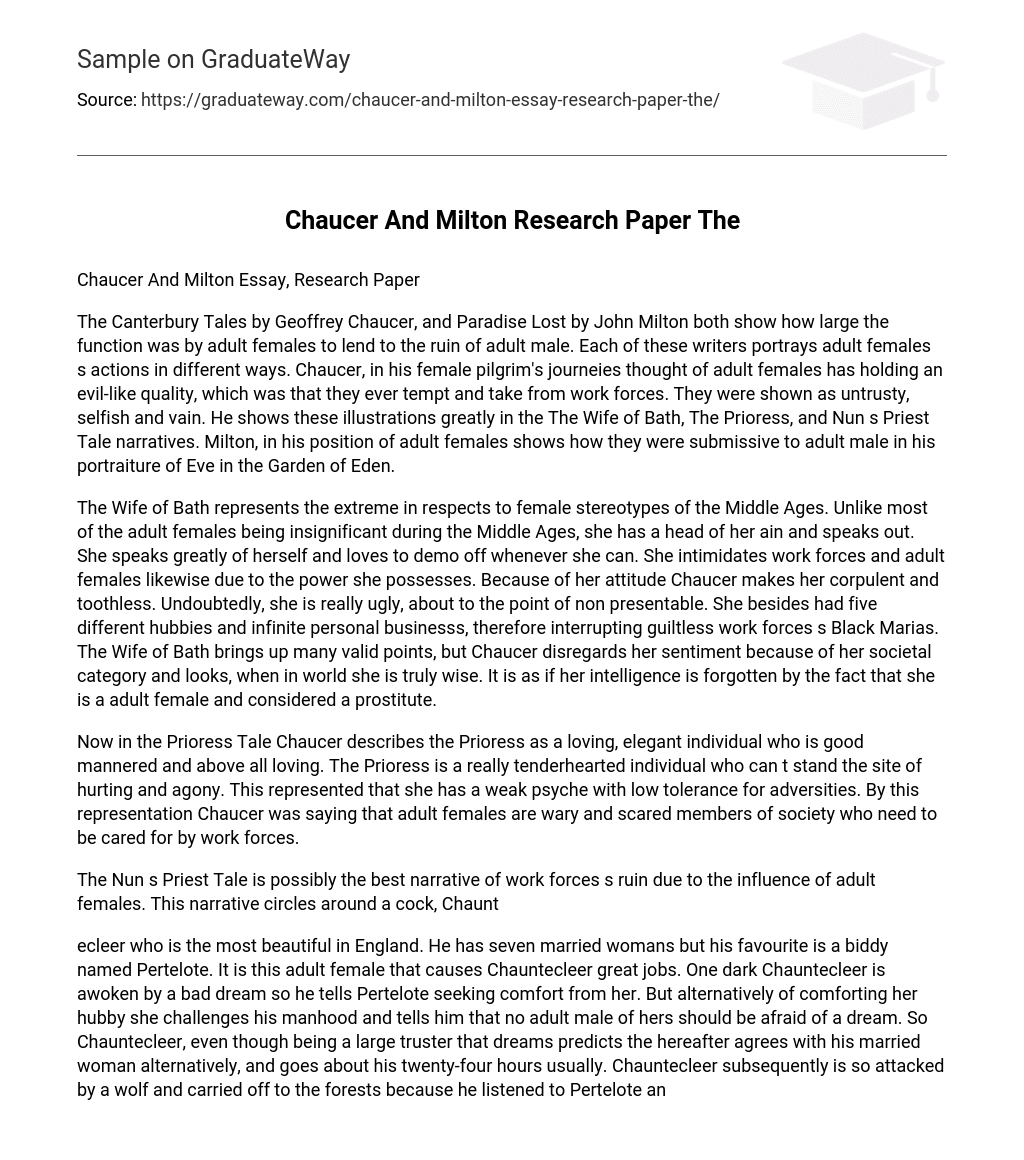The Canterbury Tales by Geoffrey Chaucer, and Paradise Lost by John Milton both show how large the function was by adult females to lend to the ruin of adult male. Each of these writers portrays adult females s actions in different ways. Chaucer, in his female pilgrim’s journeies thought of adult females has holding an evil-like quality, which was that they ever tempt and take from work forces. They were shown as untrusty, selfish and vain. He shows these illustrations greatly in the The Wife of Bath, The Prioress, and Nun s Priest Tale narratives. Milton, in his position of adult females shows how they were submissive to adult male in his portraiture of Eve in the Garden of Eden.
The Wife of Bath represents the extreme in respects to female stereotypes of the Middle Ages. Unlike most of the adult females being insignificant during the Middle Ages, she has a head of her ain and speaks out. She speaks greatly of herself and loves to demo off whenever she can. She intimidates work forces and adult females likewise due to the power she possesses. Because of her attitude Chaucer makes her corpulent and toothless. Undoubtedly, she is really ugly, about to the point of non presentable. She besides had five different hubbies and infinite personal businesss, therefore interrupting guiltless work forces s Black Marias. The Wife of Bath brings up many valid points, but Chaucer disregards her sentiment because of her societal category and looks, when in world she is truly wise. It is as if her intelligence is forgotten by the fact that she is a adult female and considered a prostitute.
Now in the Prioress Tale Chaucer describes the Prioress as a loving, elegant individual who is good mannered and above all loving. The Prioress is a really tenderhearted individual who can t stand the site of hurting and agony. This represented that she has a weak psyche with low tolerance for adversities. By this representation Chaucer was saying that adult females are wary and scared members of society who need to be cared for by work forces.
The Nun s Priest Tale is possibly the best narrative of work forces s ruin due to the influence of adult females. This narrative circles around a cock, Chaunt
ecleer who is the most beautiful in England. He has seven married womans but his favourite is a biddy named Pertelote. It is this adult female that causes Chauntecleer great jobs. One dark Chauntecleer is awoken by a bad dream so he tells Pertelote seeking comfort from her. But alternatively of comforting her hubby she challenges his manhood and tells him that no adult male of hers should be afraid of a dream. So Chauntecleer, even though being a large truster that dreams predicts the hereafter agrees with his married woman alternatively, and goes about his twenty-four hours usually. Chauntecleer subsequently is so attacked by a wolf and carried off to the forests because he listened to Pertelote and non himself. Therefore turn outing the point that adult females are the ruin of work forces.
As we look at Milton s Paradise Lost we see that he depicts Eve as a weaker low-level homo. Certainly Milton was male chauvinist; he could non be otherwise given his times and his faith. He has to state a narrative that was itself male chauvinist, because it is a myth with a societal intent. Poor Eve suffers from Milton’s clip and topographic point. She is the “weaker,” she was made non straight in God’s image but from portion of Adam’s organic structure, she must idolize God through Adam, non in her ain right. She is beautiful, yet her beauty is her ruin when the snake flatters her and convinces her to eat from the tree of cognition.
In decision Chaucer and Milton both had the same positions on adult females. They believed that adult females were weaker and had a great influence on the ruin of work forces. It was non merely in these three narratives by Chaucer that adult females were thought of as holding an evil-like quality, that they ever tempt and take from work forces, but in about every one of the narratives. They are depicted of untrusty, selfish and really vain throughout the aggregation of narratives. Milton s Eve in Paradise Lost shows in diffident position how he felt about the topographic point and function of adult females. He depicts her of a weak minded person who was easy tricked into eating the fruit and conveying down adult male. Both these writers have opinionated positions of the opposite sex and express it really strongly in their plants.





